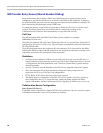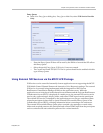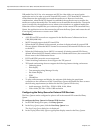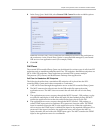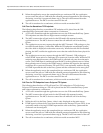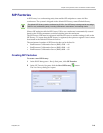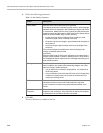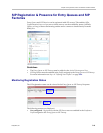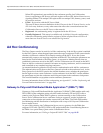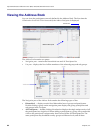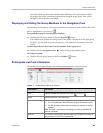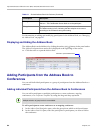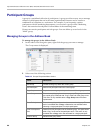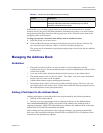
Polycom® RealPresence Collaboration Server (RMX) 1500/2000/4000 Administrator’s Guide
7-16 Polycom, Inc.
When SIP registration is not enabled in the conference profile, the Collaboration
Server's registering to SIP Servers will each register with an URL derived from its own
signaling address. This unique URL replaces the non-unique URL, dummy_tester, used
in previous versions.
• Failed - Registration with the SIP Server failed.
This may be due to incorrect definition of the SIP server in the IP Network Service, or the
SIP Server may be down, or any other reason the affects the connection between the
Collaboration Server or the SIP Server to the network.
• Registered - the conferencing entity is registered with the SIP Server.
• Partially Registered - This status is available only in Multiple Networks configuration,
when the conferencing entity failed to register to all the required Network Services if
more than one Network Service was selected for Registration.
Ad Hoc Conferencing
The Entry Queue can also be used for Ad Hoc conferencing. If the Ad Hoc option is enabled
for the Entry Queue, when the participant enters the target conference ID the system checks
whether a conference with that ID is already running on the MCU. If not, the system
automatically creates a new ongoing conference with that ID. The conference parameters are
based on the Profile linked to the Entry Queue. As opposed to Meeting Rooms, that are
predefined conferences saved on the MCU, Ad Hoc conferences are not stored on the MCU.
Once an Ad Hoc conference is started it becomes an ongoing conference, and it is monitored
and controlled as any standard ongoing conference.
An external database application can be used for authentication with Ad Hoc conferences.
The authentication can be done at the Entry Queue level and at the conference level. At the
Entry Queue level, the MCU queries the external database server whether the participant
has the right to create a new conference. At the conference level the MCU verifies whether
the participant can join the conference and if the participant is the conference chairperson.
The external database can populate certain conference parameters.
For more information about Ad Hoc conferencing, see Appendix D, "Ad Hoc Conferencing and
External Database Authentication” on page D-1.
Gateway to Polycom® Distributed Media Application™ (DMA™) 7000
Gateway to Polycom® Distributed Media Application™ (DMA™) 7000 enables audio only
PSTN, ISDN (video endpoints using only their audio channels), SIP and H.323 calls to
connect to the Polycom DMA 7000 via gateway sessions running on the Collaboration
Server. Each Collaboration Server conference acting as a gateway session includes one
connection to the endpoint and another connection to the DMA. The DMA 7000 enables
load balancing and the distribution of multipoint calls on up to 10 Polycom Collaboration
Server media servers.
As part of this solution, the Collaboration Server acts as a gateway for the DMA that
supports H.323 calls. The PSTN, ISDN or SIP endpoint dials the virtual Meeting Room on
the DMA via a special Entry Queue on the Collaboration Server.
For more information, see "Dialing to Polycom® DMA™ 7000” on page 19-25.



